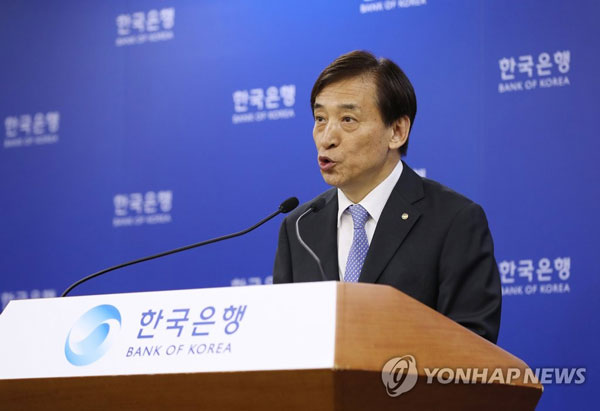In what could be a drastic shift from his earlier commitment to standing pat, the head of South Korea's central bank on Wednesday hinted at an easing policy as the trade tension between the United States and China underscores the woes of Asia's fourth-largest economy.
Bank of Korea Gov. Lee Ju-yeol had ruled out the possibility of a rate cut in the past few months sticking to the belief that the country's economy will gather pace during the second half of the year, which many claim is too optimistic in the face of the flaring-up trade frictions between the world's top two economies.
In a speech marking the 69th anniversary of the bank's foundation, BOK Gov. Lee stressed the need for what he called "appropriate measures" to deal with changes in economic conditions.

"As external uncertainties have increased due to the U.S.-China trade dispute and slump in the semiconductor market, we must take appropriate measures to accommodate changes in economic conditions while closely monitoring the direction of changes and their impact," Lee said.
Since the start of the year, the economy has been showing signs of sluggishness amid a slump in exports and business spending, he said.
"The local economy is expected to expand on increased government spending and the slump in exports and investment removed down the road, but it appears that uncertainties on our path to growth have become greater," he said.
His remarks are an about-face from what he had assessed. Previously, even last month, the BOK chief said a potential rate cut was not on the table as the economic growth would gather steam.
Two weeks earlier, the central bank decided to keep the policy rate frozen at 1.75 percent in its first split vote at least since November when the board raised the benchmark rate by 25 basis points.
The central bank is scheduled to hold its next rate-setting meeting in mid-July.
Further triggering speculation that the central bank may consider a rate reduction to boost growth, the top central banker also urged the government to take necessary measures to keep the economy growing.
"Under such stern economic conditions at home and abroad, the policymakers will also have to focus on structural reforms to enhance our growth potential from a long-term perspective while also operating macroeconomic policies so that our growth momentum may continue," he said.
The Korean government submitted a 6.7 trillion-won (US$5.6 billion) extra budget bill for parliamentary approval in April to strengthen the economy. Still, it remains unclear when South Korea's parliament can vote on the extra budget bill due to a political standoff.
A series of data recently released indicate the need for a rate cut, while most private institutes slashed their economic outlook for the economy, citing weak outbound shipments and still flagging domestic consumption.
South Korea's economy unexpectedly backtracked 0.4 percent from three months earlier in the first quarter, marking the slowest growth in more than a decade.
Its exports have also been on the wane for six consecutive months, with shipments to China, the world's single largest importer of South Korean goods, dipping since November.
Also adding to expectations of an easing policy is low inflation.
The country's inflation has remained well below the annual target of 2 percent for years, and consumer prices gained less than 1 percent for five consecutive months since the start of the year.
The BOK has slashed its 2019 growth outlook for the local economy to 2.5 percent from the 2.6 percent forecast in January.
The country's finance ministry is maintaining its growth estimate of between 2.5 percent and 2.6 percent but widely expected to trim it next month when it unveils the second-half economic policy road map.
Lee said the central bank will work to maintain financial stability but also operate its monetary policy to support stable and steady growth.
He also highlighted the need to meet the inflation target.
"As prices are at a significantly lower level than our target, we must regularly monitor our price stabilization steps and thoroughly explain our steps to help enhance the economic players' understanding of price conditions," Lee said. (Yonhap)

